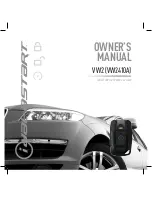
9
For
Y
our Saf
ety As
W
ell As
That Of Other
s
Storage and Disposal Precautions
n
Warning
–– Prohibited Procedures ––
l
D o n o t l e ave t h e ra d i o s y s t e m o r
m o d e l s w i t h i n t h e r e a c h o f s m a l l
children.
A small child may accidentally operate the system. This
could cause a dangerous situation and injuries. NiCd
batteries can be very dangerous when mishandled and
cause chemical damage.
l
Do not throw NiCd batteries into a
fire. Do not expose NiCd batteries to
extreme heat. Also do not disassemble or
modify a NiCd battery pack.
Overheating and breakage will cause the electrolyte to
leak from the cells and cause skin burns, loss of sight as
well as other injuries.
–– Mandatory Procedures ––
j
When the system will not be used for
any length of time store the system
with batteries in a discharged state. Be sure
to recharge the batteries prior to the next
time the system is used.
If the batteries are repeatedly recharged in a slightly
discharged state the memory effect of the NiCd battery
may considerably reduce the capacity. A reduction in
operating time will occur even when the batteries are
charged for the recommended time.
<NiCd Battery Electrolyte>
The electrolyte in NiCd batteries is a strong alkali. Should you get even
the smallest amount of the electrolyte in your eyes, DO NOT RUB. Wash
immediately with water and seek medical attention at once. The electrolyte can
cause blindness. If electrolyte comes in contact with your skin or clothes, wash
with water immediately.
n
Caution
–– Prohibited Procedures ––
l
Do not store your R/C system in the
following places.
- Where it is extremely hot or cold.
- Where the system will be exposed to direct sunlight.
- Where the humidity is high.
-Where vibration is prevalent.
-Where dust is prevalent.
-Where the system would be exposed to steam and
condensation.
Storing your R/C system under adverse conditions
could cause deformation and numerous problems with
operations.
–– Mandatory Procedures ––
j
If the system will not be used for a long
period of time remove the batteries
from the transmitter and model and store in a
cool dry place.
If the batteries are left in the transmitter electrolyte may
leak and damage the transmitter. This applies to the
model also. Remove the batteries from it also to prevent
damage.
<NiCd Battery Recycling>
A used NiCd battery is valuable resource. Insulate the battery terminals and
dispose the battery by taking it to a battery recycling center.









































